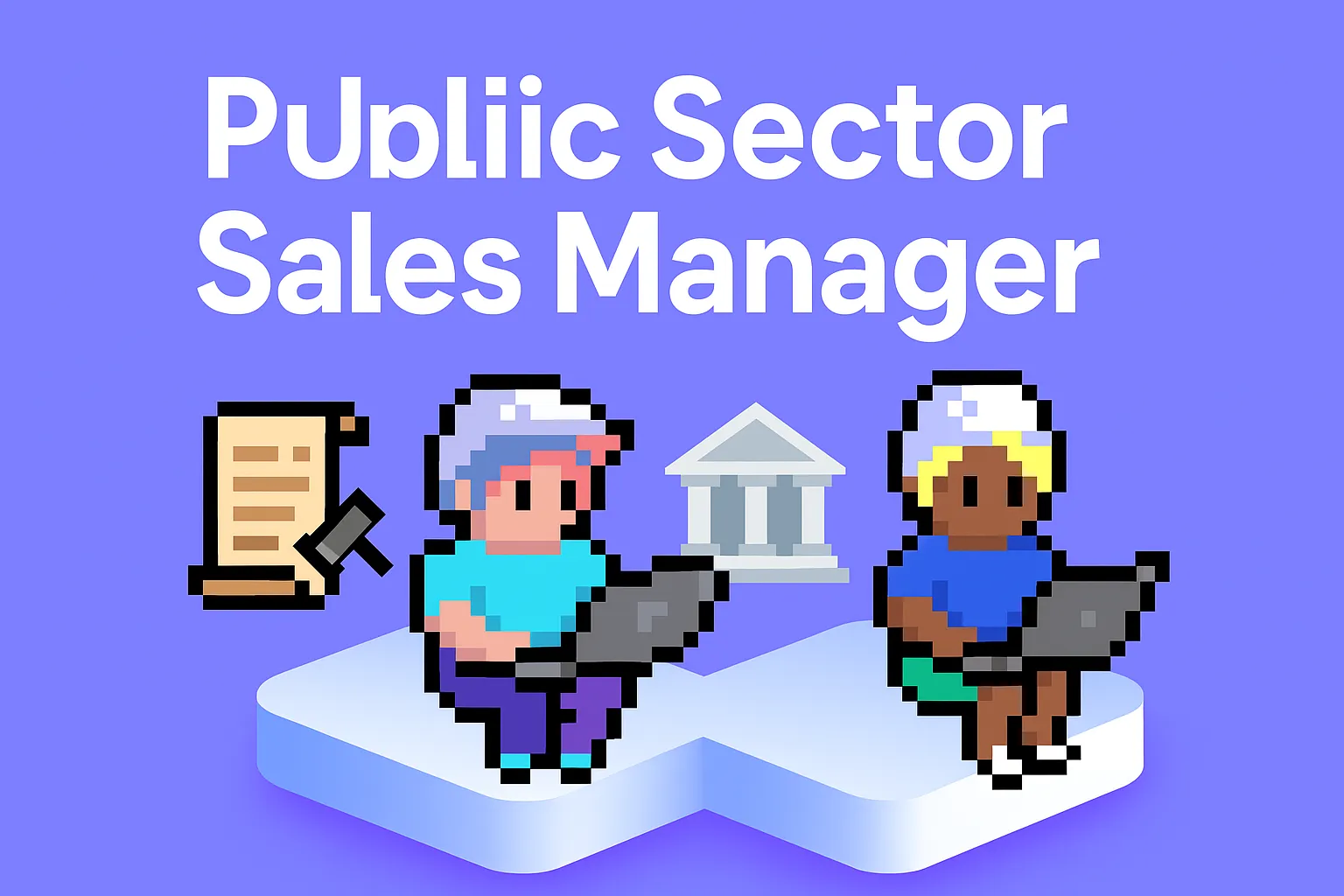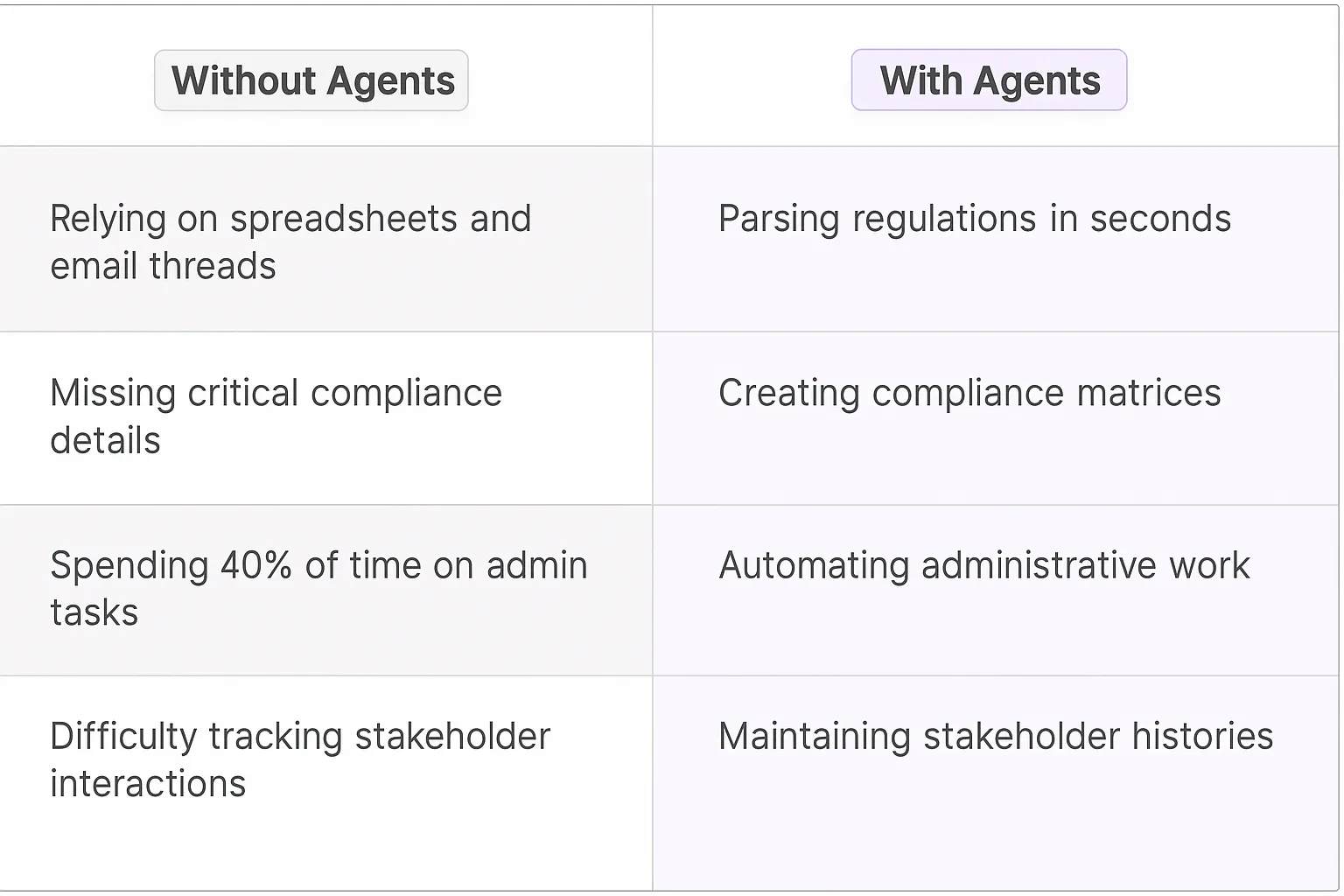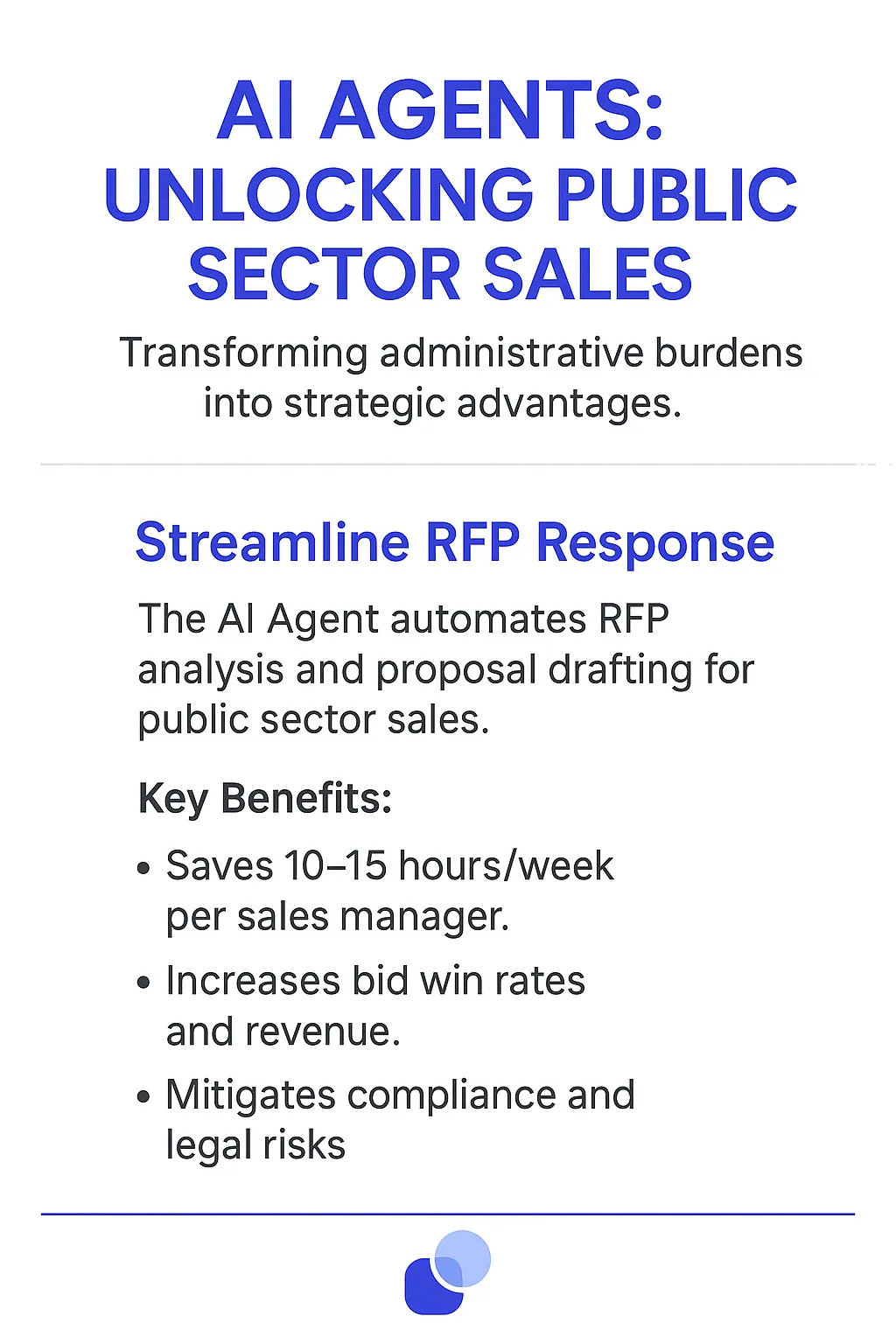Public Sector Sales Manager represents a specialized role focused on selling products and services to government agencies, educational institutions, and other public sector organizations. The position demands deep knowledge of government procurement processes, regulatory requirements, and relationship management across multiple stakeholders. When paired with AI Agents, these professionals gain powerful digital teammates that enhance their ability to navigate complex sales cycles and maintain compliance.

Public sector sales managers traditionally relied on a complex web of spreadsheets, manual reporting tools, and endless email threads to track opportunities and managing government relationships. They'd spend countless hours digging through regulatory documents, RFP requirements, and compliance frameworks - often missing critical details in the process. The old approach meant maintaining detailed contact logs in CRM systems while simultaneously trying to navigate the intricate approval chains typical in government procurement.
Digital teammates fundamentally transform how public sector sales managers operate in three key ways:
1. Regulatory Navigation & Compliance
AI Agents parse through complex government regulations and compliance requirements in seconds, spotting potential issues early in the sales cycle. They'll flag when a proposal needs specific certifications or when security requirements don't align with current capabilities - catching showstoppers before they derail deals.
2. Relationship Intelligence
The public sector runs on relationships, but tracking opportunities across multiple agencies is brutal. AI Agents monitor communication patterns, meeting notes, and historical interactions to surface relevant insights about key decision makers. They'll notice when an agency contact switches departments or when a champion mentions budget constraints in passing.
3. Procurement Cycle Optimization
Government sales cycles are notoriously long and complex. AI Agents track where deals get stuck, identify which approaches work best for specific agencies, and suggest optimal timing for follow-ups based on historical procurement patterns. They'll remind you about fiscal year deadlines and flag when competitors' contracts are up for renewal.
The real power comes from how these capabilities compound. When an AI Agent combines deep regulatory knowledge with relationship insights and procurement timing data, it creates a multiplier effect that dramatically increases win rates while reducing the cognitive load on sales managers.
This isn't just about efficiency - it's about enabling public sector sales managers to focus on what humans do best: building trust, understanding agency missions, and architecting solutions that serve citizens better.

The public sector sales landscape operates on fundamentally different principles than private sector sales. Digital teammates transform how sales managers navigate the complex web of government procurement processes, compliance requirements, and stakeholder relationships.
These AI agents excel at managing the documentation-heavy aspects of public sector sales, reducing the time spent on administrative tasks by up to 40%. They're particularly effective at maintaining detailed records of past performance and contract vehicles - critical elements that often determine success in government sales.
For sales managers handling multiple jurisdictions, these digital teammates become invaluable for tracking different procurement cycles and regulatory requirements. They can quickly adapt proposal templates to match specific agency requirements while ensuring compliance with various government purchasing regulations.
The real game-changer comes in how these agents handle the relationship-building aspects of public sector sales. They can maintain detailed interaction histories with multiple stakeholders across different agencies, ensuring consistent communication and follow-up while respecting government communication protocols.

AI agents are transforming how public sector sales managers navigate the complex landscape of government contracts and institutional relationships. These digital teammates operate as force multipliers, handling the intricate dance of compliance requirements while sales managers focus on building meaningful connections with decision-makers.
The public sector's unique purchasing cycles and multi-stakeholder approval processes create distinct challenges that AI agents are uniquely positioned to address. From managing extensive RFP documentation to tracking procurement timelines across different government agencies, these tools function as specialized partners that understand the nuances of public sector sales.
What makes AI agents particularly effective in this space is their ability to adapt to varying jurisdictional requirements while maintaining compliance across federal, state, and local levels. They're not just processing data – they're actively participating in the sales process by identifying opportunities, flagging potential compliance issues, and maintaining detailed audit trails that government procurement often demands.
The real power emerges when these digital teammates integrate with existing government contractor databases and procurement systems, creating a seamless flow of information that helps sales managers stay ahead of bid opportunities and deadline-driven submission requirements.
The public healthcare sector presents a fascinating case study for AI-powered sales management. State and local health departments manage billions in annual purchases - from medical equipment to software systems. But the traditional sales process burns countless hours on repetitive tasks and documentation.
A Public Sector Sales Manager AI agent transforms this process by maintaining deep knowledge of healthcare procurement regulations across jurisdictions. When pursuing opportunities with a state health agency, the AI analyzes historical RFP data, tracks compliance requirements, and flags potential roadblocks early.
The real magic happens in the day-to-day workflow. The AI monitors procurement portals and automatically generates compliant bid responses, pulling from a library of pre-approved content. It tracks every interaction with agency stakeholders, ensuring follow-ups happen at the right moments. During proposal development, it validates that all technical specifications align with agency requirements.
One regional medical device company saw their public sector win rate increase 47% after deploying an AI sales manager. The system caught subtle RFP requirements they previously missed and maintained perfect documentation for audit trails. Their sales team shifted focus from administrative busywork to high-value relationship building with key decision makers.
The healthcare use case highlights how AI sales managers excel at the intricate dance of public sector sales - maintaining compliance while accelerating deals through complex bureaucracies. The technology doesn't replace human sellers, but rather handles the heavy lifting that previously bogged them down.
The K-12 education market represents one of the most nuanced public sector sales environments I've studied. School districts control massive budgets but operate under strict purchasing guidelines and competing stakeholder interests. Traditional sales approaches often collapse under the weight of these complexities.
A Public Sector Sales Manager AI agent cuts through this complexity by orchestrating the entire district sales motion. It maintains an evolving database of state education funding mechanisms, district technology standards, and curriculum alignment requirements. When targeting a specific district, the AI maps out all key decision makers - from curriculum directors to IT leaders to parent committees.
The AI's pattern recognition capabilities shine in multi-district campaigns. It identifies which product features resonate with different stakeholder groups and automatically customizes pitch materials. For example, it highlights student engagement metrics for teachers while surfacing TCO calculations for finance teams. The system also tracks varying procurement schedules across districts, ensuring sales teams never miss bid windows.
A leading edtech company deployed this AI approach across their district sales team last year. The results were striking - their average sales cycle dropped from 14 months to 8 months. The AI's ability to navigate complex RFP requirements while maintaining perfect compliance documentation gave them a decisive edge. Most importantly, their sales reps spent 70% more time in meaningful conversations with educators rather than drowning in paperwork.
The education sector demonstrates why AI sales managers are transformative for public sector sales. They excel at the methodical relationship building and documentation required for district purchases while giving human sellers space to focus on what matters most - understanding and serving educator needs. This technology isn't replacing sales teams - it's removing the barriers that held them back.
Implementing AI agents for public sector sales requires navigating a complex web of regulations, security protocols, and stakeholder expectations. The public sector's unique characteristics demand careful consideration of several critical factors.
Data privacy regulations like GDPR, HIPAA, and government-specific mandates create a intricate compliance landscape. AI agents must be configured to handle sensitive information with appropriate security measures, including:
Public sector sales cycles often span 12-24 months, requiring AI agents to maintain context over extended periods. Key operational considerations include:
Government agencies often have established processes that resist rapid change. Success requires:
Public sector sales demand meticulous record-keeping. AI agents must maintain:
The key to successful implementation lies in understanding these unique challenges while maintaining flexibility to adapt to changing regulatory requirements and agency needs.
The integration of AI Agents into public sector sales management marks a significant shift in how government contracts are pursued and won. These digital teammates don't just automate tasks - they fundamentally enhance the capabilities of sales managers by providing deep regulatory insights, maintaining perfect documentation, and optimizing complex procurement cycles. The success stories from healthcare and education sectors demonstrate that AI Agents serve as force multipliers, allowing sales professionals to focus on what truly matters: building relationships and delivering value to government agencies. As public sector procurement continues to evolve, the partnership between human sales managers and their AI counterparts will become increasingly vital for success in this challenging market.